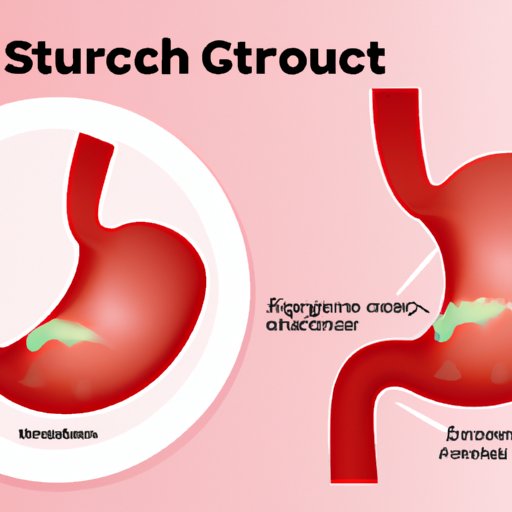
Introduction
A stomach ulcer is a sore that develops in the lining of the stomach or the first part of the small intestine. It’s important to know if you have one because they can lead to more serious health problems if left untreated. In this article, we will explore the symptoms, causes, diagnosis, treatment options, home remedies, and lifestyle changes you can make to prevent stomach ulcers.
Symptoms of Stomach Ulcers
The symptoms of a stomach ulcer may vary from person to person, but the most common symptoms include:
- Abdominal pain: a burning or gnawing pain in the belly
- Nausea
- Loss of appetite
- Bloating
- Heartburn/acid reflux
- Vomiting
Causes of Stomach Ulcers
Stomach ulcers can be caused by a variety of factors, including:
- H. pylori bacteria: a type of bacteria that can cause infection in the stomach
- Overuse of NSAIDs: nonsteroidal anti-inflammatory drugs, such as aspirin and ibuprofen, can irritate the lining of the stomach
- Alcohol use
- Smoking
- Stress
- Acidic foods: such as citrus fruits, tomatoes, and spicy foods
Diagnosis of Stomach Ulcers
If you suspect you have a stomach ulcer, your doctor may perform one or more of the following tests:
- Physical exam: to check for abdominal tenderness or swelling
- Endoscopy: a procedure where a flexible tube with a camera on the end is passed down your throat to examine your stomach and small intestine
- Biopsy: a small piece of tissue from your stomach or small intestine may be removed for testing
- Stool sample analysis: to check for the presence of H. pylori bacteria
Treatment Options for Stomach Ulcers
The treatment options for stomach ulcers may include:
- Medications: such as antibiotics to kill H. pylori bacteria, acid reducers to reduce stomach acid, and medication to protect the lining of the stomach
- Surgery: in rare cases, surgery may be needed to treat complications such as bleeding or perforation
- Lifestyle changes: reducing stress, quitting smoking, and avoiding alcohol and acidic foods
Home Remedies for Stomach Ulcers
In addition to medical treatment, there are several home remedies that may help alleviate the symptoms of a stomach ulcer:
- Aloe vera: drink aloe vera juice or take a supplement to help soothe the stomach
- Probiotics: taking a probiotic supplement may help promote healthy digestion
- Licorice root: drinking licorice tea or taking a supplement may help protect the lining of the stomach
- Honey: taking a spoonful of honey may help soothe the stomach
Lifestyle Changes to Prevent Stomach Ulcers
The following lifestyle changes may help prevent the development of stomach ulcers:
- Reducing alcohol intake
- Quitting smoking
- Eating a healthy diet that includes plenty of fruits and vegetables
- Reducing stress through exercise, meditation, or relaxation techniques
Complications of Stomach Ulcers
Left untreated, stomach ulcers can lead to more serious health problems such as:
- Internal bleeding
- Perforation: when the wall of the stomach or small intestine is breached
- Obstruction: when the entrance or exit of the stomach or small intestine is blocked
Conclusion
Knowing the symptoms and causes of stomach ulcers is important for early detection and treatment. If you suspect you have a stomach ulcer, it’s important to seek medical attention right away. With the right treatment and lifestyle changes, you can prevent stomach ulcers from developing and protect your overall health.





